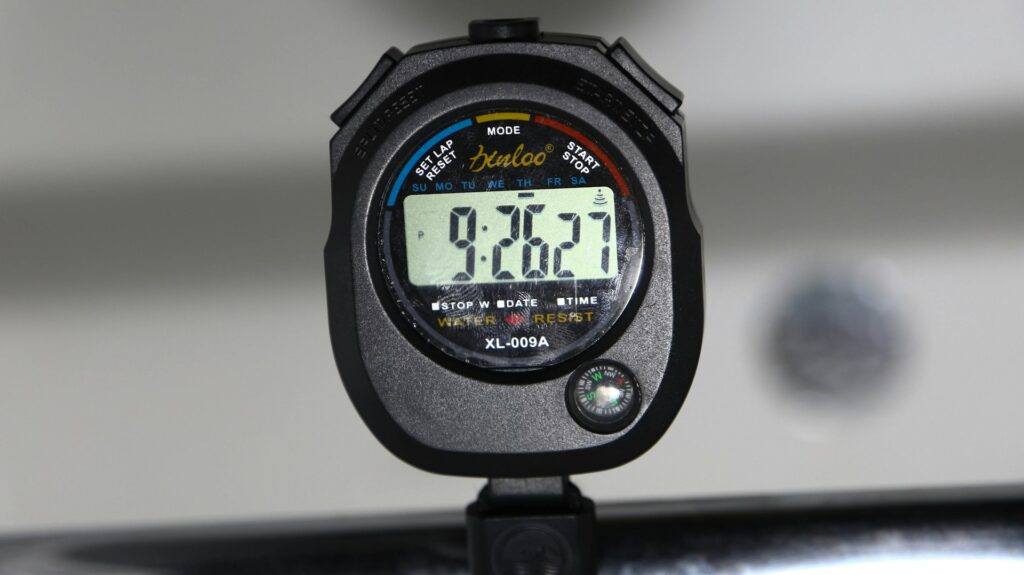
Body + Mind is reader-supported. We may earn an affiliate commission when you buy through some of the links on our site.
Once you get comfortable with a running routine, you might start timing your workouts. Understanding how quickly you complete a mile helps gauge whether you’re a competitive or casual runner. Learning what a good mile time is for and why the results are different for everyone will help you understand your body better and aim for more achievable goals.
People research things like average mile time to gauge their health. Running can protect against numerous cardiovascular conditions, but you won’t know if your health is improving without a baseline measurement. Your typical mile time is that starting point. If you run a 13-minute mile, you’ll know your body needs time and training to reach a seven-minute race time.
A mile is 5,280 feet long or 1,760 yards. People use it as a standard measurement for running because organizations determine their race distance in miles or yards. Training for the same distance will prepare you for an upcoming competition or help you decide when to stop running while improving your speed per mile.

Good mile times are different for everyone. Someone with a chronic lung condition may have a slower race than someone who’s new, but has no health conditions. However, you can start your journey to improved running speeds by comparing your average jog with results measured by experts:
| Average 5k Running Speeds | ||
| Age | Women (Minutes Per Mile) | Men (Minutes Per Mile) |
| 16-19 | 9:34 | 12:09 |
| 20-24 | 9:30 | 11:44 |
| 25-29 | 10:03 | 11:42 |
| 30-34 | 10:09 | 12:29 |
| 35-39 | 10:53 | 12:03 |
| 40-44 | 10:28 | 12:24 |
| 45-49 | 10:43 | 12:41 |
| 50-54 | 11:08 | 13:20 |
| 55-59 | 12:08 | 14:37 |
| 60-64 | 13:05 | 14:47 |
Multiple factors influence each person’s timing. Someone new to running might finish a 10k in 90 minutes or longer, while an experienced runner could cross the finish line in 43-50 minutes. Their training informs how their muscles handle the endurance of each run.
Your age will also change your average mile time. Aging bodies may have more joint pain during a longer race and require walking breaks. You might need a slower running speed to accommodate for age-related lung capacity or elasticity challenges as well.
Someone fueling their body with nutrient-dense foods may finish a mile faster than someone eating a highly processed diet. You need to give your body essential nutrients for your training to be successful. Hydration is a crucial component in that, too.
People can’t achieve the same mile time because everyone has a different body. The fastest mile ever ran was just over three minutes and 43 seconds, but not everyone has the physical stamina or training time as Hicham El Guerroujb did. You might not have the schedule flexibility to train like a professional athlete either.
The way you train will affect your mile timing too. Treadmills can change your gait because they assist in foot turnover with the moving belts. Running outdoors involves a more focused, motivated gait.

While your running time will vary according to your body, training experience, running schedule and other factors, you can aim for average goals to guide your workouts. Pay attention to your body’s cues to adjust your exercise routine for its needs as you refine your pacing.
The average running speed for a beginner is 10-12 minutes per mile, so a good two-mile time could be 20-22 minutes. Aim for that timing and see how you feel. You may have a naturally faster pace or require training to reach the 12-minute-per-mile mark.
A good three-mile time is around 30 minutes, given the average 10-minute mile for runners. If you test your pacing and finish below that timing, you may be more advanced than you thought.
A good four-mile time is at least 40 minutes, but the most important factor is your ability to finish the four miles comfortably. If you cross the finish line at 40 minutes and you’re in immense pain or dizzy from lack of oxygen, you may need to slow your pace until you train to a 40-minute race time.

Once you know what a good mile time is for the average person, you can establish goal posts for your workouts. Consider your health factors, running experience and if you want to participate in any competitions to mark your current pace and determine how to reach your ultimate mileage goal.
Navy SEALs have to run 1.5 miles in 9-10 minutes or within 10:30 minutes at most. Given those standards, they’d have to finish a four-mile run in 36-40 minutes to remain within the competitive timing standards. Given the hardcore physical fitness expectations to become a Navy SEAL, you can expect that many prospective candidates can finish their runs well before those minute markers.
You can shave time off your mile time by building muscle strength. Getting stronger increases your speed and power through additional soft tissue resiliency. You can also do interval training by varying your running and walking rounds during a workout. The pace variation improves your cardiorespiratory fitness by making your heart and lungs stronger. You’ll consume and use oxygen more efficiently, powering your body to maintain a faster speed.
A reasonable mile time goal for a new runner is the average 10-12 minutes per mile pace outlined above. However, you may have a slower pace if you have health conditions or have never run before. Time yourself during a one-mile jog to see what your natural pace is and determine your training routine from there.
A good mile time by age will vary per person. Your health history, average workouts, muscle stamina and body composition are a few factors influencing your per-mile pace. Older individuals should give themselves more room to have longer mile times due to the effects of aging on their lungs, heart and muscles.
A good mile time for women is 10:03 if they’re between 25-29 years old. Men within the same age range have an average mile time of 11:42 minutes. Gender may influence your muscle composition due to differing testosterone levels, which could change your natural endurance.
Your email address will only be used to send you our newsletter, and at any time you may unsubscribe. For more information, see our Privacy Policy.